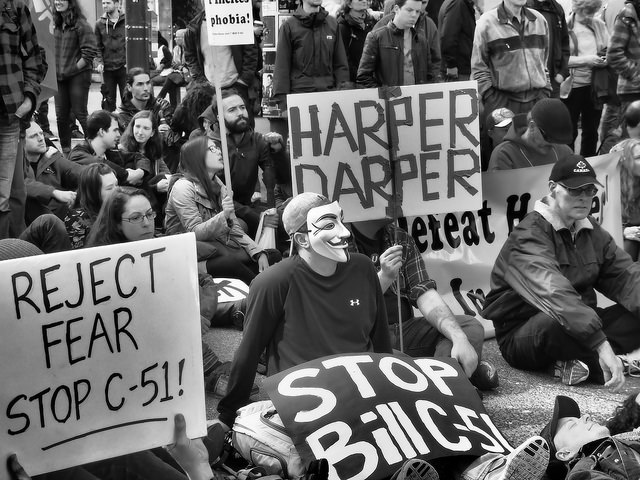News reports are heightening concerns about how C-51, the Harper government’s so-called “anti-terrorism” legislation, could be used against people protesting against its extreme resource extraction agenda of tar sands expansion and pipelines.
The Canadian Press reports, “Canada’s spy agency helped senior federal officials figure out how to deal with protests expected last summer in response to resource and energy development issues — including a pivotal decision on the Northern Gateway pipeline. The Canadian Security Intelligence Service prepared advice and briefing material for two June meetings of the deputy ministers’ committee on resources and energy, documents obtained under the Access to Information Act show.”
The article notes, “Traditional aboriginal and treaty rights issues, including land use, persist across Canada, [CSIS assistant director for policy and strategic partnerships Tom] Venner said in the memo to CSIS director Michel Coulombe in advance of a June 9 meeting of deputy ministers. …Prior to the federal decision [to approve the Northern Gateway pipeline], Venner drafted a second memo for a follow-up meeting of the deputy ministers on June 19, in which he laid out CSIS assessments of three scenarios: approval, approval with aboriginal consultation, or rejection. Much of the content is blanked out. …Public Safety Canada may lead deputy ministers in a guided discussion ‘that will consider possible federal responses to protest and demonstration incidents,’ Venner added.”
In November 2013, the Vancouver Observer reported that CSIS and the RCMP had worked with the National Energy Board to coordinate intelligence on opponents of the Northern Gateway pipeline, including the Council of Canadians. The newspaper notes, “Documents show the NEB working with CSIS and the RCMP to make ‘security plans’ for the Vancouver, Victoria, Kelowna and Prince Rupert hearings and actively coordinating with officials from Enbridge and TransCanada Corporation and a private security contractor hired by the NEB.”
This follows a Globe and Mail article last month in which the newspaper reported, “The RCMP has labelled the ‘anti-petroleum’ movement as a growing and violent threat to Canada’s security, raising fears among environmentalists that they face increased surveillance, and possibly worse, under the Harper government’s new terrorism legislation.”
The Council of Canadians has argued that the surveillance of social movement groups has increased under the Harper government. This past weekend, 27 Council of Canadians chapters across the country protested against the Harper government’s C-51 legislation. For more on that, please click here.
Photo: Sally T. Buck/flickr



